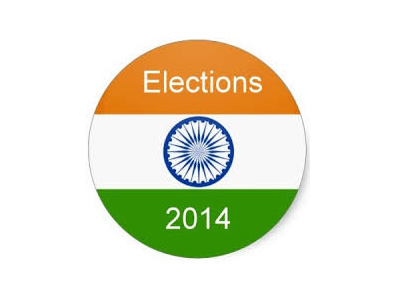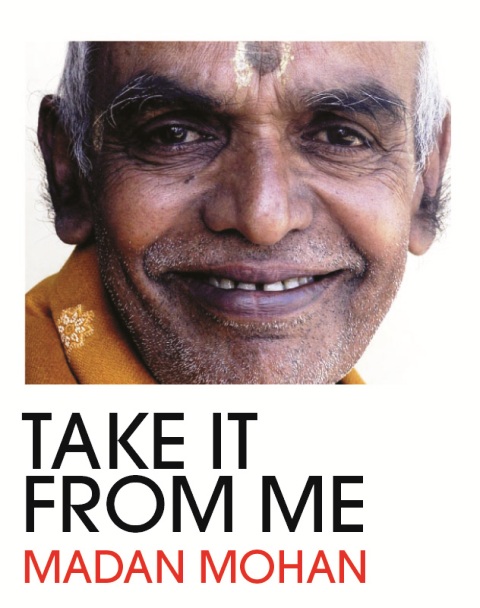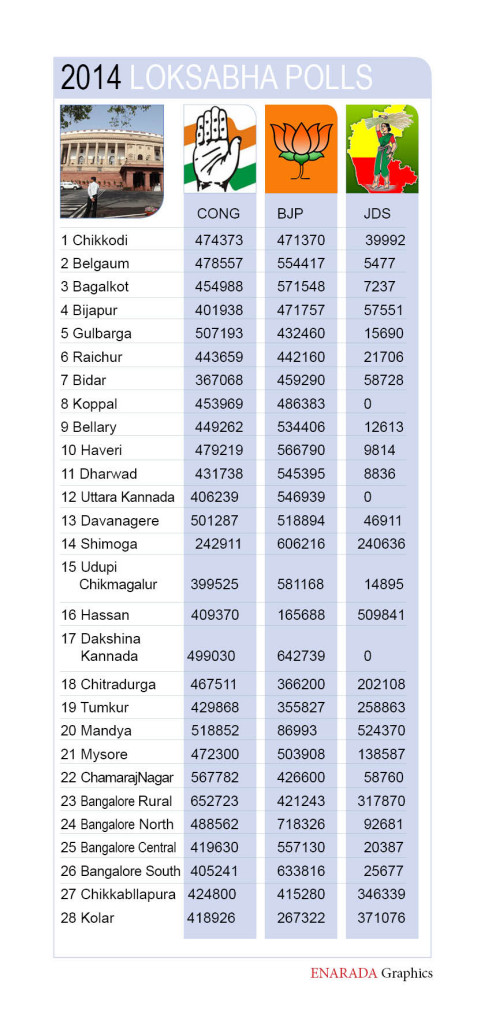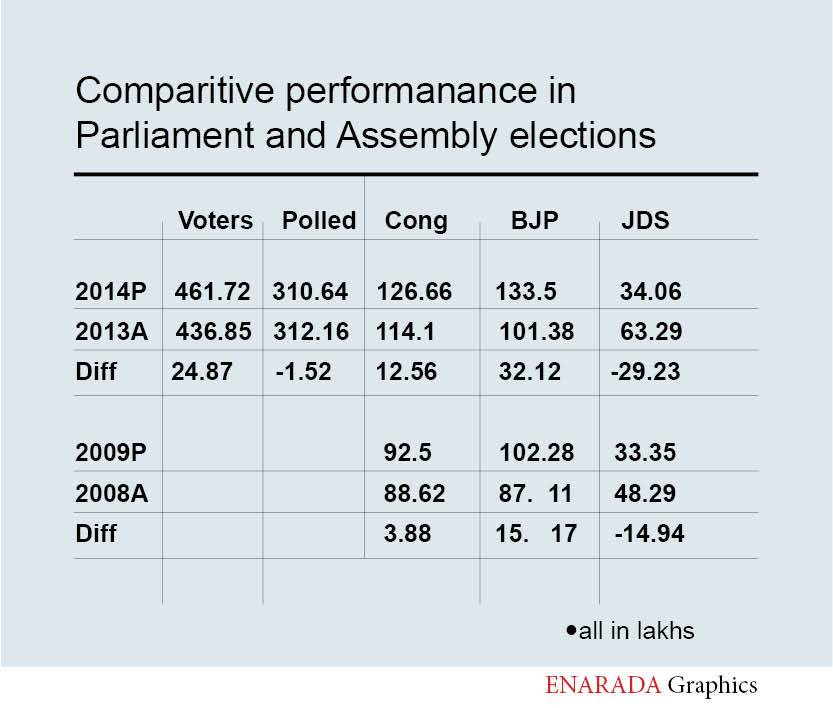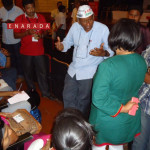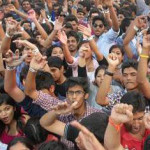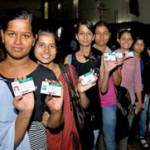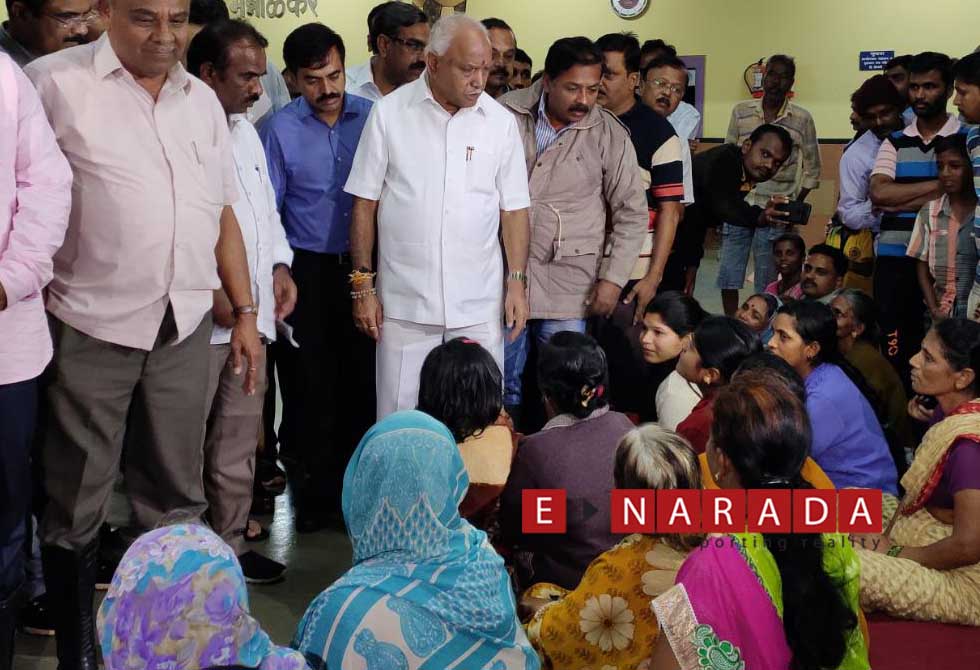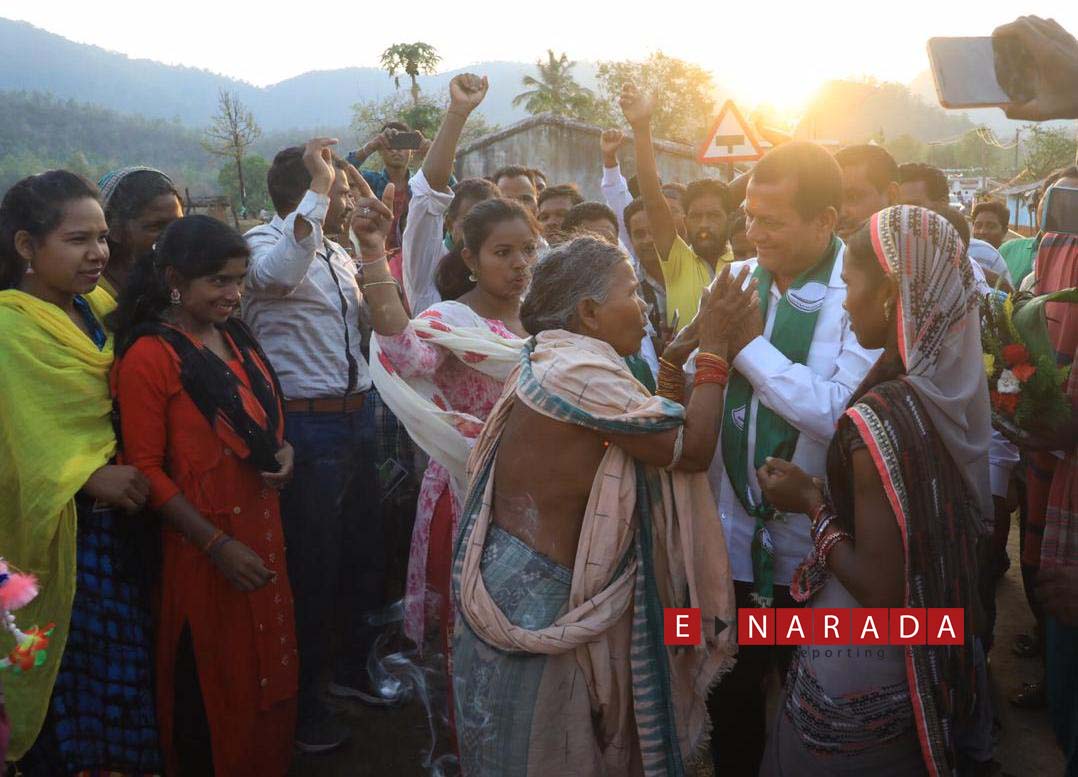ENARADA, Hubli,
By MATHIHALLI MADAN MOHAN
The first time voters have done it again. They have helped the BJP to regain the political primacy and respectability it had lost in last year’s assembly elections, both in terms of seats won and vote secured.
Karnataka witnessed an unusual surge in the enrolment, with a record number of 25 lakhs enrolling themselves as voters within one year as against the record of 25-30 lakhs in a five year period as it used to be in the past. The average increase per parliamentary constituency was over 90,000, with the enrolment crossing two lakh marks in three constituencies including Bangalore South, which had received the national attention because of the epic fight between the IT czar Nandan Nilekani and the BJP’s national leader Ananth Kumar, who was on his sixth outing in the parliamentary election.
The new voters basically represent the anti-establishment sentiments in general and anti Congress in particular. In Karnataka, the track record has been that the new voters of the sheet anchors of the phenomenal political rise of the BJP during the 1999-2008 period, during which it grew in strength to be able to come to power and coming on par almost with Congress in terms of vote base. They have hardly considered JD(S) as worthy of attention as a political alternative to the Congress.
The emergence of the AAP on the eve of loksabha elections had posed an unusual dilemma, as to whether the new voters gravitate towards the AAP, which would be at the peril of the BJP, since the good show of the BJP in containing Congress in its quest for power for Delhi essentially hinged on the unstinted support of the new voters.
But the expectation of the AAP weaning away a major chunk of support from first time voters were belied. What all the AAP could get in the state was a mere 2.57 lakh votes out of total of 25 lakh first time voters. In the four parliamentary constituencies of Bangalore Rural, Central, North and South, out of more than 7 lakh first time voters, the AAP could get little more than one lakh votes, with Balakrishnan formerly of Infosys in Bangalore Central polling the highest of nearly 40,000 votes.
BJP was in doldrums politically a year ago, because of the heavy political price it had to pay for their internecine quarrel, with Yeddyurppa and Sriramulu ceding away from the parent party in search of independent political pasture, which proved to be a case of unmitigated disaster. The BJP had lost power, faced reverses and its electoral base suffered serious erosion. The BJP and its two splinter units could hardly survive politically but were force to be reckoned with against Congress if they were come together. For the silver lining was that their mutual recrimination notwithstanding, they were the beneficiaries voters’ munificence. But the homecoming of the renegades was a political imperative but bristled with too many imponderables and ego problems.
But the things started moving once the loksabha elections were announced and Narendra Modi was named as the prime ministerial candidate. Corruption charges against Yeddyurappa and Sriramulu’s were ignored and they were brought back into the party with view to mopping up support for BJP, in its race for the prime minister’s gaddi, ignoring the objections of Mr. Advani, Mrs. Sushma Swaraj and others.
While the BJP in an election mode, had taken the first important step, the first time voters did the rest aided by the Modi wave, in the form a highest ever turn out in the parliament election in the electoral annals of Karnataka to pip the political rival in its race for numbers and votes. Karnataka was able to register a highest poll turn out o (67.28%), with 310.64 lakh voters exercising franchise in an electorate of 461.72 lakhs. Again for the first time, the gap of five to ten percent of voting between the assembly and parliament elections was reduced drastically. 310.64 lakh voters had turned up for voting as against 312 lakh voters in the last year’s assembly election. The gap between the two elections was just around 1.50 lakhs
The BJP was able to win 17 of the 28 loksabha seats, as against 9 of Congress and 2 seats for JDS. The party’s vote base, reached new high of 133.50 lakhs, pushing Congress (126.66 lakhs) to the second place. The BJP had garnered an additional 32 lakhs votes and above the combined voting strength of BJP+KJP+BSR Congress in the 2013 elections. All the first times votes to the extent of 25 lakhs, barring 2.5 lakhs which had gone to AAP, had apparently fallen in the BJP kitty. And the additional votes to the extent of 10 lakhs have obviously come from the JDS, which is the only party, which has suffered a serious erosion of base to the extent 26 lakhs over its 2013 performance.
Compared to 2009, it is a loss of two seats for the BJP. But the fact remains that the party lost three seats Chikodi, Raichur and Chikballapur by a narrow margin. It is a case of remarkable political recovery considering political straits in which the party had found itself after 2013 election. The party stood chances of winning just two seats on its own initially which improved to ten after the home coming of Yeddyurappa and BSR Congress and ultimately landed with 17 seats thanks to the support of the first time voters and Modi wave. Perhaps if the AAP were not to nibble away 2.50 lakh votes, its seats tally would have touched the 20 seat mark. Of the 19 seats it had won in 2009, the BJP lost four seats Chikkodi, Chitradurga, Raichur, Tumkur and gained Bidar, and Mysore.
The performance of the Congress is not bad, since it has won nine seats, three seats more than what it had done in 2009. However the expectations were that one year reign of the party government led by Mr. Siddaramaiah would bring a bonanza to Congress which was terribly in search of numbers. Apparently, the party government made a limited impact, with party getting an additional three seats and 12 lakh votes. It faced a terrible embarrassment with its failure to retain the Mysore seat, which is the home district of the Chief Minister and several of his colleagues. This was despite the party putting up a good performance in the 2013 elections, which had placed the party in an unassailable position. Of the six seats it had won in 2009, the Congress lost Bidar and Mysore and gained instead, five, Chikkodi, Raichur, Chitradurga, Tumkur and Bangalore Rural,.
As for as the JDS is concerned, it has been proved once again that the party cannot rest on its laurels of the assembly performanance in the loksabha polls. A substantial chunk of its voters turn towards the major political parties in the parliament elections. This has happened this time also, with the party suffering serious erosion of its base. As against 66 lakhs votes it has secured in the 2013 assembly election, the party could mop up a support of 34.06 lakhs, leading to the inference that around 28 32 lakhs voters have preferred to look at other parties. The party which had won three seats could get only two seats. It retained Hassan and Mandya (which had lost in the bye elections) and lost Bangalore Rural.
Two examples Chikkodi and Mysore could be cited to illustrate the point, where the upset victories came mainly because of the switch in the loyalty of JDS voters. Chikodi was a constituency where BJP was sure to retain the seat. JDS which had polled around 88,000 votes in the assembly election suffered an erosion of 48,000, which mainly contributed to the upset victory etched by the Congress albeit with a narrow margin of 3000 votes. The Congress could poll an extra 75,000 votes in this parliamentary constituency, while there was a deficit of 3,000 votes for BJP.
In the case of Mysore, the position was reverse. It was a constituency where Congress could not fail, because of the massive lead it had got in the assembly poll and Congress was too sure romp home even if all the new voters numbering over one lakh were to vote for BJP. But the voters of the JDS played a spoil sports game upsetting the Congress dreams. JDS, which could poll more than 3 lakh votes last time, could secure only 1.38 lakh votes, while the BJP got an additional support of 2.41 lakh votes to what it had received in the assembly elections to reach 5.03 lakh mark. The Congress got an increase of just around 28,000 and lost the seat by a margin of 31,000 votes. The flight of the JDS votes in favour of the BJP lends credence to rumors circulating in Mysore that the JDS lent its support to BJP.
In Raichur both the Congress and the BJP stood on even keel. The presence of the nearly one lakh new voters had buoyed up the chances of BJP retaining the seat. But it lost by a narrowest margin of less than 2,000 votes. While the BJP received an additional 1.22 lakh votes inclusive of the new voters, the Congress tally was up by more than 61.000 seats. Incidentally the JDS votes had plummeted from 2.28 lakh votes to mere 21,000 in a constituency which registered one of lowest voter turnouts. That whatever votes were cast by the JDS supports went the Congress way can be easily inferred.
Chikballapur constituency was another where the Congress was comfortably placed but still it had to huff and puff to retain the seat by margin of less than 9500 vote and Kumaraswamy of the JDS was pushed to the third position by a resurgent BJP which moved up with a massive additional support of 1.40 lakh of which nearly one lakh came from the new voters.
(Posted on May 20 , 2014 @ 11:30am)
(Author is a Senior Journalist and Columnist. He can be reached at madan.mm@gmail.com and his Mobile no is +91 94480-74872 )
The views expressed on the website are those of the Columnists/ Authors/Journalists / Correspondents and do not necessarily reflect the views of ENARADA.

